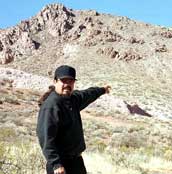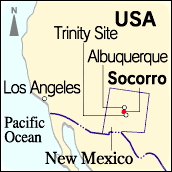Discounted Casualties:The Human Cost of Depleted Uranium, Part 3 <1>Disclosure – Test firing of radioactive weapons
May 14, 2000
Depleted uranium (DU) penetrators made in American munitions factories are tested at a number of firing ranges to evaluate quality and destructive power. When these radioactive weapons age, they are discarded like ordinary weapons. While investigating the impact of DU on Gulf War veterans and communities near factories, I also visited firing ranges and disposal sites. People living in these areas are struggling with environmental contamination and health problems, a struggle made more difficult by the thick walls behind which the authorities hide the facts.
(Story and photo by Akira Tashiro, senior staff writer)
"Entry prohibited. This is as far as we go. That mountain in front is the firing range," says Damacio Lopez (56), who is wearing a black cap and sunglasses. He handles the wheel carefully. "A patrol car could come along any minute. You can only take pictures from inside the car."
Entry blocked by barbed wire
We make a U-turn in front of the headquarters of the Energetic Materials Research Test Center affiliated with New Mexico Institute of Mining and Technology. Lopez checks to be sure no patrol cars are around, then drives along a rough road lined with shrubs. He parks in the shade of a tree not far from the firing range. We climb fifty or sixty meters up a crumbly hillside. From that height, we look down on a barbed wire fence stretching into the distance. At regular intervals, fence signs warn, "NO TRESPASSING, PROHIBIDO ENTRAR." About three kilometers (less than two miles) to the east lies the town of Socorro, population 8,000, its houses fanning out into the desert.
We are about 125 kilometers (78 miles) south of Albuquerque, New Mexico, and less than 50 kilometers (31 miles) northwest of Trinity, where the first atomic test in human history took place on July 16, 1945.
"The house where I was born and raised is the one closest to the firing range," says Lopez, pointing in the direction of his house.
The former pro-golfer of mixed Mexican, Hispanic, and Indian ancestry now works for an NGO (non-governmental organization). To escape poverty, he joined the airforce at 17. At 22, after leaving the service in 1965, he went to university where he played for the golf club. In 1969, he turned pro and appeared frequently in tournaments until 1985. Near the end of that year he was injured in an auto accident and returned to his hometown to recuperate.
Strong blasts and cracks in the walls
"The tests began right after I arrived in Socorro-tremendous explosions. It was so bad we got cracks in our walls." Lopez was so surprised, he attended a meeting of the university's Board of Regents and asked what the tests were and who was conducting them. "They're nothing but tests of simple conventional weapons." Surprised to be confronted by questions no one had asked before, the university authorities gave carefully guarded answers.
Several weeks later, some cardboard boxes were delivered to Lopez by workers at the firing range. "They were full of contracts and other documents exchanged between the college and the companies manufacturing DU munitions shells regarding the use of the firing range and even the money involved."
Confirmed by the president's insults
Lopez, who now understood that radioactive weapons were being tested near his home, went directly to the president of the university to request a halt to the testing. He was armed with plenty of evidence. The irate president answered, "What's the matter with you, boy? Don't you understand English? It's depleted uranium. There's no radioactivity so it doesn't make any hazard. You should learn English."
The term "depleted" does mean "used up" or "made empty," so when many Americans hear it, they assume that "depleted" uranium must not be dangerous. To Lopez, however, the president's words were an insult to Native Americans, Mexicans, and Hispanics, the sort of discrimination to which American society constantly subjects them.
"It is no exaggeration to say that the president's words changed my life." That was the first step in Lopez' long journey investigating the health effects of depleted uranium.
(Originally published on May 14, 2000)
Convinced by inside information
"Entry prohibited. This is as far as we go. That mountain in front is the firing range," says Damacio Lopez (56), who is wearing a black cap and sunglasses. He handles the wheel carefully. "A patrol car could come along any minute. You can only take pictures from inside the car."
Entry blocked by barbed wire
We make a U-turn in front of the headquarters of the Energetic Materials Research Test Center affiliated with New Mexico Institute of Mining and Technology. Lopez checks to be sure no patrol cars are around, then drives along a rough road lined with shrubs. He parks in the shade of a tree not far from the firing range. We climb fifty or sixty meters up a crumbly hillside. From that height, we look down on a barbed wire fence stretching into the distance. At regular intervals, fence signs warn, "NO TRESPASSING, PROHIBIDO ENTRAR." About three kilometers (less than two miles) to the east lies the town of Socorro, population 8,000, its houses fanning out into the desert.
We are about 125 kilometers (78 miles) south of Albuquerque, New Mexico, and less than 50 kilometers (31 miles) northwest of Trinity, where the first atomic test in human history took place on July 16, 1945.
"The house where I was born and raised is the one closest to the firing range," says Lopez, pointing in the direction of his house.
The former pro-golfer of mixed Mexican, Hispanic, and Indian ancestry now works for an NGO (non-governmental organization). To escape poverty, he joined the airforce at 17. At 22, after leaving the service in 1965, he went to university where he played for the golf club. In 1969, he turned pro and appeared frequently in tournaments until 1985. Near the end of that year he was injured in an auto accident and returned to his hometown to recuperate.
Strong blasts and cracks in the walls
"The tests began right after I arrived in Socorro-tremendous explosions. It was so bad we got cracks in our walls." Lopez was so surprised, he attended a meeting of the university's Board of Regents and asked what the tests were and who was conducting them. "They're nothing but tests of simple conventional weapons." Surprised to be confronted by questions no one had asked before, the university authorities gave carefully guarded answers.
Several weeks later, some cardboard boxes were delivered to Lopez by workers at the firing range. "They were full of contracts and other documents exchanged between the college and the companies manufacturing DU munitions shells regarding the use of the firing range and even the money involved."
Confirmed by the president's insults
Lopez, who now understood that radioactive weapons were being tested near his home, went directly to the president of the university to request a halt to the testing. He was armed with plenty of evidence. The irate president answered, "What's the matter with you, boy? Don't you understand English? It's depleted uranium. There's no radioactivity so it doesn't make any hazard. You should learn English."
The term "depleted" does mean "used up" or "made empty," so when many Americans hear it, they assume that "depleted" uranium must not be dangerous. To Lopez, however, the president's words were an insult to Native Americans, Mexicans, and Hispanics, the sort of discrimination to which American society constantly subjects them.
"It is no exaggeration to say that the president's words changed my life." That was the first step in Lopez' long journey investigating the health effects of depleted uranium.
(Originally published on May 14, 2000)









